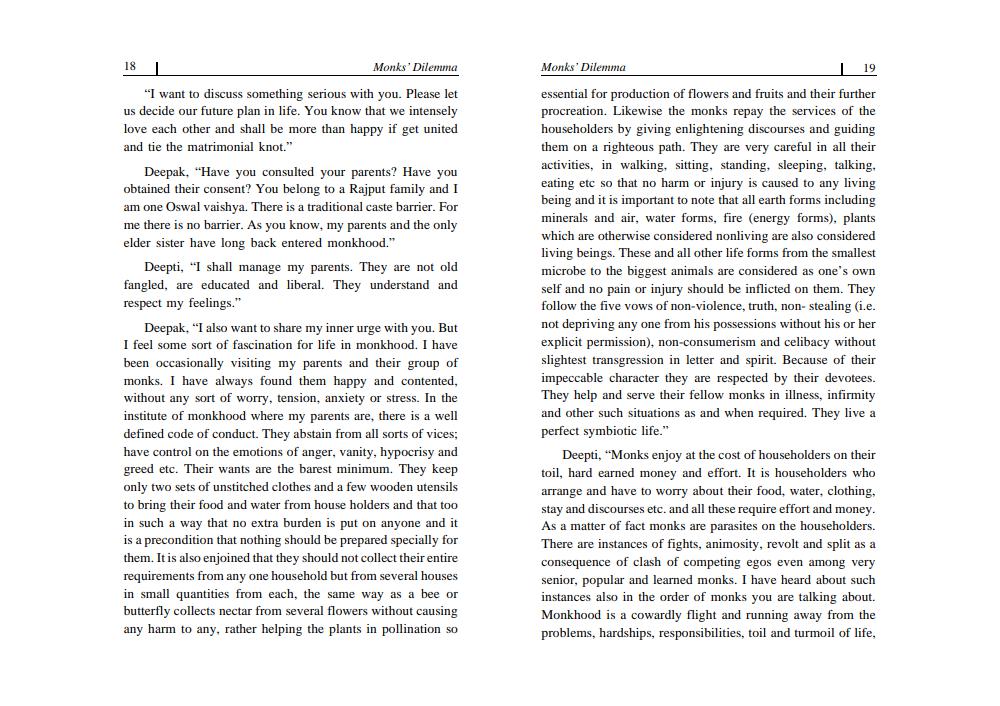Book Title: Monks Dilemma Author(s): S M Jain Publisher: ABD Publisher View full book textPage 9
________________ 18 Monks 'Dilemma Monks' Dilemma 19 "I want to discuss something serious with you. Please let us decide our future plan in life. You know that we intensely love each other and shall be more than happy if get united and tie the matrimonial knot." Deepak, "Have you consulted your parents? Have you obtained their consent? You belong to a Rajput family and I am one Oswal vaishya. There is a traditional caste barrier. For me there is no barrier. As you know, my parents and the only elder sister have long back entered monkhood." Deepti, "I shall manage my parents. They are not old fangled, are educated and liberal. They understand and respect my feelings." Deepak. "I also want to share my inner urge with you. But I feel some sort of fascination for life in monkhood. I have been occasionally visiting my parents and their group of monks. I have always found them happy and contented, without any sort of worry, tension, anxiety or stress. In the institute of monkhood where my parents are, there is a well defined code of conduct. They abstain from all sorts of vices: have control on the emotions of anger, vanity, hypocrisy and greed etc. Their wants are the barest minimum. They keep only two sets of unstitched clothes and a few wooden utensils to bring their food and water from house holders and that too in such a way that no extra burden is put on anyone and it is a precondition that nothing should be prepared specially for them. It is also enjoined that they should not collect their entire requirements from any one household but from several houses in small quantities from each, the same way as a bee or butterfly collects nectar from several flowers without causing any harm to any, rather helping the plants in pollination so essential for production of flowers and fruits and their further procreation. Likewise the monks repay the services of the householders by giving enlightening discourses and guiding them on a righteous path. They are very careful in all their activities, in walking, sitting, standing, sleeping, talking, eating etc so that no harm or injury is caused to any living being and it is important to note that all earth forms including minerals and air, water forms, fire (energy forms), plants which are otherwise considered nonliving are also considered living beings. These and all other life forms from the smallest microbe to the biggest animals are considered as one's own self and no pain or injury should be inflicted on them. They follow the five vows of non-violence, truth, non- stealing (i.e. not depriving any one from his possessions without his or her explicit permission), non-consumerism and celibacy without slightest transgression in letter and spirit. Because of their impeccable character they are respected by their devotees. They help and serve their fellow monks in illness, infirmity and other such situations as and when required. They live a perfect symbiotic life." Deepti, "Monks enjoy at the cost of householders on their toil, hard earned money and effort. It is householders who arrange and have to worry about their food, water, clothing, stay and discourses etc. and all these require effort and money. As a matter of fact monks are parasites on the householders. There are instances of fights, animosity, revolt and split as a consequence of clash of competing egos even among very senior, popular and learned monks. I have heard about such instances also in the order of monks you are talking about. Monkhood is a cowardly flight and running away from the problems, hardships, responsibilities, toil and turmoil of life,Page Navigation
1 ... 7 8 9 10 11 12 13 14 15 16 17 18 19 20 21 22 23 24 25 26 27 28 29 30 31 32 33 34 35 36 37 38 39 40 41 42 43 44 45 46 47 48 49 50 51 52 53 54 55 56 57 58 59 60 61 62 63 64 65 66 67 68 69 70 71 72 73 74 75 76 77 78 79 80 81 82 83 84 85 86 87 88 89 90 91 92 ... 100
